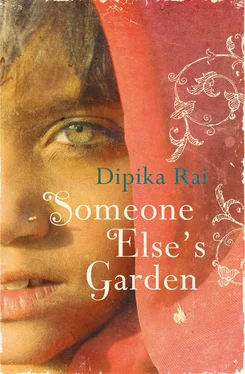‘Okay, we are ready,’ says Lata Bai to Seeta Ram when he comes home for lunch. ‘I am taking Mamta and Shanti,’ she adds, quickly placing his tray at his feet. Her husband winces, the name Shanti is too new, too disappointing, too female.
‘So what about Sneha?’ he says, pulling Prem and Mohit to one side of the hut, separating the females from the males as if in some fiercely competitive game. ‘Take the girls, the boys are staying with me.’
Lata Bai cradles Shanti and leaves without looking back at the house. The women walk towards the tonga stand under a flowing ficus tree, an hour away. She hides the baby deeper inside her pallav to spare her the sunlight that can crisp skin faster than an open flame. It beats down on them like a pounding stick, knocking all the energy out of their stride. The Red Ruins glimmer in the distance. Two girls are praying at the shrine. Lata Bai walks faster, lifting her hand in acknowledgement, but not her head.
‘Who are they?’
‘Must be some girls from the village, come to pray for sons.’
‘When I’m married, I will come here to pray for sons too. I wish I was a boy. Bapu says to wait and see, my husband will sort me out well and good. I think he’s waiting for that.’ In Seeta Ram’s eyes Mamta has no right to exist at all, but since she does, she has to prove herself day after day, working harder than the boys, eating nothing that might be noticed, and being silently present. Like the extra baby section in an orange, not missed if it isn’t there, but swallowed whole if it is, without releasing any of its flavour into the mouth.
‘I won’t let my husband rule over me. Husbands aren’t kings, you know.’
‘Look here, Mamta,’ Lata Bai takes hold of her daughter’s shoulders tight and hard, ‘you will not survive a day with that attitude. For now, work sincerely at home and stay out of your bapu’s way. That’s the best and safest thing for you to do. Pray to Devi every night that your husband is kind to you . . .’
‘. . . and that he won’t beat you or send you back to us in disgrace,’ adds Sneha, who has learned the lesson of womanhood much faster and better than her elder sister.
‘Huh. Small mouth, big talk,’ says Mamta.
Under the appointed tree, Lata Bai opens her blouse to suckle Shanti. ‘Sneha, you better go home. Nani hasn’t room for us all. You can visit her any time, let Mamta have her attention, she is going away for good. I promise I’ll take you next winter.’
‘Next winter! But Nani might be dead next winter!’
‘Sneha, back to the house! If you start walking now, you’ll be there before sunset,’ says Lata Bai, brushing aside Sneha’s tears.
‘Stay out of Bapu’s way and he won’t even notice you are back,’ says Mamta viciously.
* * *
They arrive early in the morning, to the smell of home fires.
‘Arey, Lata, what’s happened to this girl of yours? Look at her hair, it is orange,’ says the grandmother, tugging at Mamta’s oily plait.
‘Oho, what am I to do, he won’t give her food. Each time I say give her food he says, “Am I made of money? Do you think we live in the Big House? Throw some more oil into her hair, it’ll get black in no time at all.” Then he says, “Look at her huge belly, is that the belly of a starving child?”’ Of course they all know that a distended belly means starvation. How many children have they seen die holding their ball-bellies in their hands? But Mamta’s father creates his own mirage, an image that suits his ends. He neither minds nor cares if she lives or dies.
‘Come. Come here. Now you will have more to eat. You need meat on your bones, good body fat before you are married. We don’t want your husband thinking we cheated him, do we?’ says Mamta’s grandmother, putting their hands in red clay and plastering their handprints on the mud walls of her house. ‘In case I never see you again, your hands will hold me as I ride Yamraj’s bull to my next life.’
‘I won’t let Yamraj take you any time soon, Nani. You can’t go before you’ve told us all the stories.’
‘Look at this girl of yours, Lata, to be married soon, and still she wants to hear only stories.’
‘Why do you think I brought her here, Amma?’ laughs Lata Bai. ‘For your stories . . . and your food, of course. Hai, I am exhausted, her ears are never satisfied.’
‘Come, see your bapu, Lata. Not that he’ll know you.’
The women enter the hut. Lata Bai touches her father’s feet. He is lying on the charpoy, loosely tied to the rope bed with strips of sari material.
‘Namaste, Bapu.’
‘Who?’ The man’s eyes seem to float in their sockets, moving from his daughter to his granddaughter’s face. Lata Bai kneels by his side and runs her fingers over his feet.
‘It’s Lata, I’m here,’ she says.
‘Who?’ He asks no one in particular.
The grandmother replies. Her frustration reaches into her gullet and pulls her voice out of her throat, catapulting it to a high pitch: ‘Your daughter is here!’
‘Sh, sh, Amma, sh, he’s not deaf. Bapu, it’s Lata.’ The husband and father lies on the charpoy, useless to the two women who depend on him. ‘You remember me, don’t you? It’s Lata.’ An unconscious thought flashes through her mind which makes complete sense of the situation. Men, you can’t count on them, even if your life depends on it, and still, she looks on with eyes full of love for her father.
‘Bapu, we’re here now. Don’t worry. You can come out to greet us whenever you are ready.’ Of course by the ‘you’ Lata Bai means his inner self, for her mother has no intention of freeing her senile husband to wander off and leave her a virtual widow. Her mother takes him to the outhouse herself and walks him round and round the yard like a cow threshing wheat. Some evenings, she oils his hair, or massages his feet, or clips his toenails, whatever is dictated by her mental calendar built up over six years of care and feeding.
‘Leave it, Lata, he can’t change. Not even though you are here.’
‘So what’s wrong with him, Nani?’
‘Oh, he’s been like that for years; I just hope he has a few more left in him. I don’t want to survive your grandfather. At least he’s given me a good life. Now just look at him . . . doesn’t know who I am. I’m afraid one day he’ll wander away and then the villagers will think him dead. And then your mother’s brothers will come to take this land away from me.’
‘Why? You saved them in the drought.’
‘Yes, I did. I confused Death into thinking my boys were girls by making them wear their dead sisters’ clothes. I painted their eyes with kohl and put bangles on their wrists, so Yamraj spared their lives. I did my duty, child, but no one cares for the past, least of all sons. Just look at that Pavan, threw his mother out of the hut the instant she became a widow and when she refused to leave, he dragged her out by her hair. When you are rejected by your own blood, what will other people do but shun you as well.’
‘Oh, Nani, no one will throw you out. You can come live with Amma if they do.’
Her grandmother just smiles at the naïveté of the offer given with love. Of course she could never go to Lata Bai’s house. Not even to visit, let alone to live. That would be the one thing that would disgrace her daughter like no other. Since Lata Bai has been married her mother has only been to see her once, and that time she stayed in the back of Saraswati Stores with the stinking fertiliser that burned her eyes and gave her headaches. She met her daughter at the well, and refused all her presents and food during her stay so she would not be a burden to her.
‘Nani, story. Tell us about the dry season, when all my aunts died.’ Mamta has always been a long-story girl; in that department, she was born mature.
Читать дальше












